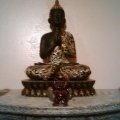Welcome home! Please contact lincoln@icrontic.com if you have any difficulty logging in or using the site. New registrations must be manually approved which may take several days. Can't log in? Try clearing your browser's cookies.
Fullness of Potential
 QuangKsanti
A human residing in Hamilton, Ontario, Canada. The Hammer in Ontario, Canada, eh Veteran
QuangKsanti
A human residing in Hamilton, Ontario, Canada. The Hammer in Ontario, Canada, eh Veteran
We are all constantly reminded of the emptiness of form but @How just inspired a question I thought I'd ask the group.
How often do we remind ourselves of the fullness of potential or the form of emptiness?
Just seeing if the question inspires or triggers any insights.
A shot in the dark.
1


Comments
david,i recently saw in u-tube-ia,a zen monk say we are everything and nothing.
I am not presently sure that “form is only pure” and “pure is all form” ( insert void or emptiness if you prefer) are actually teachings which can function effectively in a theoretical separation from each other.....
but
In Zen, the form of emptiness can be represented as Satori or kensho but we all know what a waste of time it is reminding ourselves of something that only shows up when we’ve forgotten to remind ourselves about it..
&
elsewhere in Buddhism, a study of dependent origination is a good reminder of the form of emptiness but my number one favorite is a daily perusal of the Prajnaparamita which is the best guide to "hitch-hiking nowhere in the universe" that my meditation ever bought me.
Personally not as much as I used to. And I used this transcending duality by oxymoronic paradox teaching a lot ...
It is now a bit like neti-neti and now this ...
https://www.wisdomlib.org/definition/neti-neti
... or rather drive yourself to the edge, dance on both sides and then point the moon at the finger 🤪
We aim for perfection? No. We accept the floors/flaws or Base Buddha (that be us). So the thing is ... nothing really ...
I’d agree with that, the question presupposes a certain theoretical thinking. I’m not convinced whether a mastery of the theory actually contributes to a mastery of the practical aspects either.
I sometimes use the fullness of potential to inspire thoughts of hopefulness, when my thinking has taken a depressive turn.
If that makes any sense.
vice versa,nothing is everything.the potential. its a cycle like an hour glass.it's an interesting dharma object.
Very beautiful!
Here's one stripped down version I found that works for me
When one is with deepest wisdom of the heart: that is beyond discriminative thought,
the five skandhas reveal themselves, in their self-nature as void, unstained & pure.
Here, form is only pure, pure is all form; for there is nothing more than this,
for what is form is pure and what is pure is form.
The same exists for all sensation, thought, activity and consciousness,
where all things are pure in that they're neither born nor do they wholly die.
They are not stained nor yet immaculate, increasing not, decreasing not.
No eye, ear, nose, tongue, body, mind;
no forms, tastes, sound, color, touch or objects;
vision none; no consciousness;
no knowledge and no sign of ignorance.
Until we come to where old age and death have ceased - and so has all extinction of old age and death, for here there is no suffering, nor yet again is there accumulation, nor annihilation, nor an Eightfold path, no knowledge, no attainment.
In the mind of those who are truly one with wisdom great, all obstacles dissolve:
and going on beyond this human mind, sufferings cessation itself reveals.
Hail the circular mantra of great wisdom's intent in going, going on + beyond: and always going on beyond, always becoming Buddha.
@how, I'm not even sure what "pure" really means. Subjectively or objectively. I do agree wholeheartedly about the Heart Sutra and enjoyed the version you provided.
@Kerome, it makes perfect sense. It is exactly the reason I make a point of mentioning it every so often.
I relate better to the 2nd way you phrased it because I think it is a play on words to say we are both everything and nothing. When we drop the labels, we are nothing in particular but "nothing" is a subjective concept. I think that is more about dis identification.
Emptiness as potential works better and is more logical than emptiness as nothing. Potential is not nothing.
I agree with you...so
In the third response from the begining of this thread I wrote that the translation of "pure" can be exchanged for "void or emptiness".
>
yes,a play on words,but significant.everything and nothing is the karmic probability and effect to everything and nothing.so it is speaking in general the nature of karma's potential nature to affect what could be in everything and nothing.in a way,if we word,everything with form and nothing as emptyness,then generally speaking,form and emptyness,is the interdepent exchange of karmic behavior. so when it is said,form is emptiness,it speak to it's inner karmic nature.and vice versa to emptiness is form.
>
When we drop the labels, we are nothing in particular but "nothing" is a subjective concept. I think that is more about dis identification.
>
imo,he is talking to the nature of not self .i am nothing,not self,but aggregate of karmic form.
agreed.an hour glass,in my opinion can reflect form and emptyness.
sorry quote out of wack,david hope you can cypher it.
I think the only time I use the word "pure" is for potential as in "pure potential" which to me, means the same as the void and emptiness so I guess I see it the same.
I can, thank you.
Sometimes we don't see the two sides of the one coin we hold in our palm, that coin being a wish-fulfilling gem of sorts for the modern world, what with that world's having money make that world go round and whatnot. But I digress.
(T250.847c10 Heart Sūtra)
Form is emptiness, and emptiness is form. This has a lot of implications that we don't always consider when we see slogans like this thrown about -- two sides of the coin, etc. There's a reason why Rev. Kazuaki Tanahashi translates 空 (emptiness) as "boundlessness:"
(Heart Sūtra, translated by Rev. Kazuaki Tanahashi)
Rev. Tanahashi's translation is an interpretation, and he's translating a different recension than the text I translated above, but with regards to his translation being 'interpretive,' aren't they all really, each and every? And what Rev. Tanahashi is doing here is not really going against the spirit of the text, it's simply adapting the text to explain said text to someone to whom it is less accessible in its original version. That is a noble feat.
Venerable Nāgārjuna said "For whom emptiness is possible, everything is possible” in his magnum opus, the Mūlamadhyamakakārikā, and he meant that. This is the "boundless" side of emptiness manifest in textual witness.